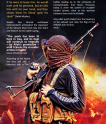On the horrors of apocalyptic warfare, 2: to spark a messianic fire
[ by Charles Cameron — it’s what we won’t notice that can blindside us ]
.
al-Malhamah al-Kubra, the great end-times battle
**
To recapitulate: in my previous post I suggested that “apocalyptic, end-of-days” movements are qualitatively different by virtue of the immediacy of their divine / transcendant mandate. Richard Landes sums the matter up nicely in his book Heaven on Earth: The Varieties of the Millennial Experience:
For people who have entered apocalyptic time, everything quickens, enlivens, coheres. They become semiotically aroused — everything has meaning, patterns. The smallest incident can have immense importance and open the way to an entirely new vision of the world, one in which forces unseen by other mortals operate. If the warrior lives with death at his shoulder, then apocalyptic warriors live with cosmic salvation before them, just beyond their grasp.
**
Here’s my concern, having lived a while in Malibu — and once watched on a friend’s TV in Santa Monica as a fire that had leapt the Ventura Freeway and swept down towards the Malibu Colony – rerouted by the fire service to go down the sparsely inhabited Corral Canyon, where as it happened I then lived..
Brush fires.
The human terrain is dry tinder, not yet ablaze – but a spark will ignite it, and the blaze then spread “like wildfire”.
The problem here is that we are far more disposed to read surfaces than undercurrents, news articles than the comments beneath them, what’s happening than what’s primed to happen, kinetic rather than potential energies. And so when potential goes kinetic, we are blindsided, caught off guard, faced with events we then characterize in retrospect as “unanticipated” — even though a little observation of what’s stirring below the surface would have allowed us to anticipate them…
What’s the equivalent, in contemporary Islamic terms, of dry underbrush of the sort that can suddenly ignite?
An expectation of the Mahdi’s coming – present enough in AQ some years back that AQ Central issued a caution against its people making premature claims concerning the Mahdi; present in IS but distanced by the possibility of a sequence of Caliphs preceding the Mahdist moment [cf McCants, Appendix 4]; and overall present to a considerable degree in the Islamic countries Pew polled in 2012:
The survey also asked respondents about the imminence of two events that, according to Islamic tradition, will presage the Day of Judgment: the return of the Mahdi (the Guided One who will initiate the final period before the day of resurrection and judgment) and the return of Jesus. .. In nine of the 23 nations where the question was asked, half or more of Muslim adults say they believe the return of the Mahdi will occur in their lifetime, including at least two-thirds who express this view in Afghanistan (83%), Iraq (72%), Turkey (68%) and Tunisia (67%).
A qualification is in order here. The British scholar Damian Thompson has shown in his remarkable study, Waiting for Antichrist, that it is possible for people to express expectation of a messianic “soon coming”– and still save for the college tuition of children who would presumably arrive at college age during the epoch of the “new heaven and new earth”. Expressing expectation, then, in a soon-coming Mahdi as much as a soon-coming Christ, does not necessarily imply “on the edge of one’s seat” expectation in real time. It is, however, suggestive…
Given dry conditions, then, to return to our analogy, what sort of spark can start a wildfire?
**
The Zipper metaphor.
Page 1 of 3 | Next page
